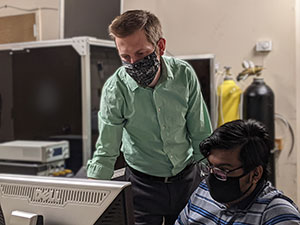
Contact Us
Institutional Communications
Bureau of Mines Building, Room 137
Laramie, WY 82071
Phone: (307) 766-2929
Email: cbaldwin@uwyo.edu

UWs Caleb Hill Receives NSF CAREER Award to Study Chemistry at the Single
Published January 07, 2021

Caleb Hill (standing), an assistant professor in UW’s Department of Chemistry, received
an NSF CAREER Award. He will use his award to study the chemical behavior of nanoparticles.
He will then apply these methods as tools for discovery of new, cost-effective catalyst
materials for water splitting, carbon dioxide conversion or fuel cells. Here, Hill
discusses data with Maksudur Rahman, a Ph.D. student in UW’s Department of Chemistry.
(Kristin Di Bona Photo)
A University of Wyoming faculty member is developing analytical methods that will allow scientists to characterize the chemical behavior of individual reactive entities, such as nanoparticles. He and his team will then apply these methods as tools for discovery of new, cost-effective catalyst materials for water splitting, carbon dioxide conversion or fuel cells.
Caleb Hill, an assistant professor in UW’s Department of Chemistry, received a big boost toward this research endeavor when he was recently notified he will receive a $600,000 Faculty Early Career Development (CAREER) Program Award from the National Science Foundation (NSF).
“Chemical systems are traditionally studied at a macroscopic scale, using methods which can tell us on average how fast reactions are occurring,” Hill says. “Many systems with important applications in energy conversion and storage, however, are highly heterogeneous, which makes them difficult to study using these traditional methods.
“By developing tools to study heterogeneous systems, such as nanoparticles, at the single-entity level, we will be able to vastly improve our understanding of how to design materials for a specific purpose,” he says.
Hill will receive continuing grant funding for his project, titled “CAREER: Methods for Targeted, High-Throughput Single-Entity Analyses.” The grant starts March 1 and ends Feb. 28, 2026.
The research will be conducted in Hill’s laboratory at UW, he says.
Spreading Knowledge
As part of the NSF CAREER Award, Hill will conduct some public outreach. Hill says these outreach activities are designed to raise interest in STEM (science, technology, engineering and mathematics) fields by teaching students the basics of measurement science.
“We will be initiating an education outreach/inreach program focused on measurement science,” Hill says. “The goal of this program is to teach K-12 students about the basics of scientific measurements and allow them to carry out their own analytical projects using the extensive infrastructure at UW.”
The CAREER Program offers the NSF’s most prestigious awards in support of junior faculty who exemplify the role of teacher-scholars through outstanding research, excellent education and the integration of education and research within the context of the mission of their organizations. Such activities should build a firm foundation for a lifetime of leadership in integrating education and research.
“This award will give my group the freedom to explore exciting new avenues of research,” he says.
The Chemical Measurement and Imaging Program within the Division of Chemistry of NSF recommended Hill for the award. Budgeted over five years, the grant funding will support Hill, his graduate students and undergraduate students to carry out research and travel to conferences so the students will be able to share and discuss their work with researchers from other institutions.
Hill’s laboratory at UW focuses on the development and use of combined electrochemical and spectroscopic tools to probe chemical behavior at the single particle, or even single molecule level, with an emphasis on electrocatalytic and photoelectrochemical materials relevant to renewable energy systems.
Hill received his Ph.D. in physical chemistry from the University of Alabama and his bachelor’s degree in chemistry from Jacksonville State University. Before joining UW, he was a postdoctoral fellow at the University of Texas-Austin from 2014-16.
Contact Us
Institutional Communications
Bureau of Mines Building, Room 137
Laramie, WY 82071
Phone: (307) 766-2929
Email: cbaldwin@uwyo.edu

